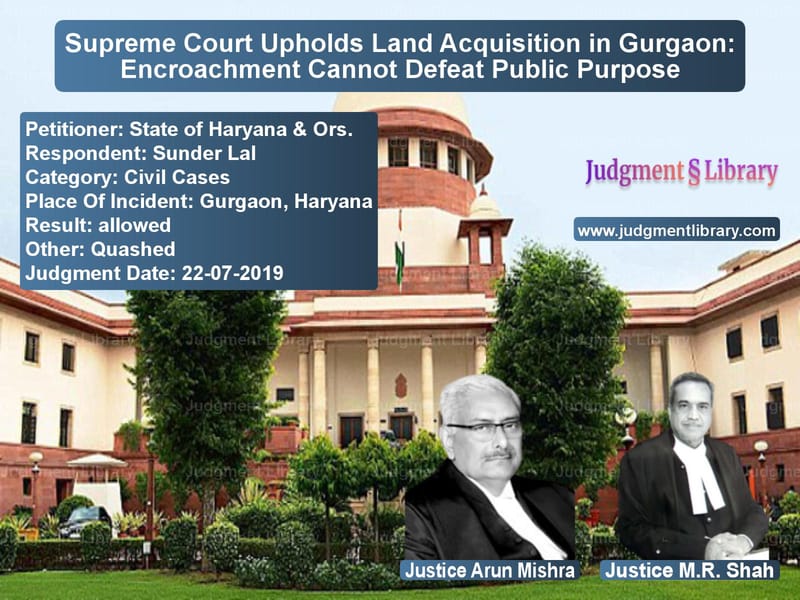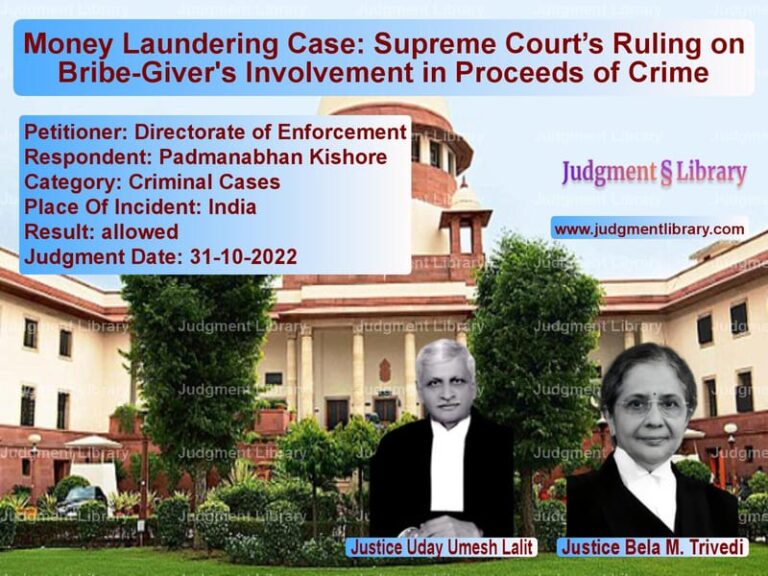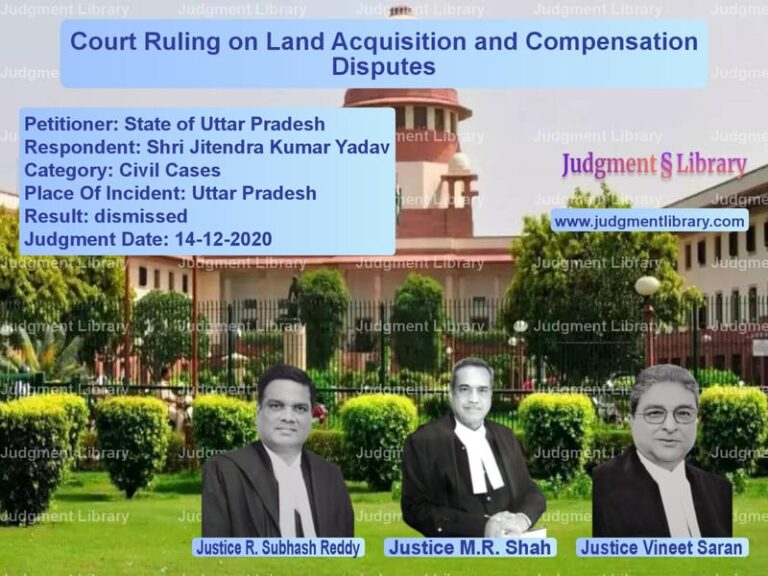Supreme Court Upholds Land Acquisition in Gurgaon: Encroachment Cannot Defeat Public Purpose
The case of State of Haryana & Ors. vs. Sunder Lal is a crucial ruling regarding land acquisition and the legal consequences of encroachment on acquired land. The Supreme Court set aside the judgment of the Punjab & Haryana High Court, which had ruled in favor of the landowner, Sunder Lal, declaring the land acquisition lapsed under the Right to Fair Compensation and Transparency in Land Acquisition, Rehabilitation and Resettlement Act, 2013.
The dispute arose when the Haryana government acquired land in Sector 57, Gurgaon, for residential, commercial, and institutional development. Sunder Lal, the respondent, filed a petition claiming that the acquisition had lapsed as possession was not taken. The state contended that possession was legally taken in 2003 and the respondent had later encroached on the land. The Supreme Court ruled in favor of the state, upholding the validity of the acquisition.
Background of the Case
The key events leading to the dispute were:
- On August 24, 2000, the Haryana government issued a notification under Section 4 of the Land Acquisition Act, 1894, to acquire 189.93 acres in Gurgaon.
- The acquisition aimed to develop residential, commercial, and institutional areas in Sector 57.
- The final award was passed on July 21, 2003, and compensation was disbursed.
- The government claimed possession was taken and recorded through Rapat No. 583 on July 21, 2003.
- Sunder Lal filed a writ petition in 2015, claiming the acquisition had lapsed under Section 24(2) of the 2013 Act, arguing possession had never been taken.
- The High Court ruled in his favor, leading the state to appeal before the Supreme Court.
Petitioner’s Arguments
The State of Haryana, represented by legal counsel, made the following arguments:
- Possession was legally taken on July 21, 2003, and documented in a government record (Rapat No. 583).
- A watchman was posted to guard the acquired land, and possession was announced publicly.
- Sunder Lal had received compensation via cheque on July 31, 2003, and had no legal right to challenge the acquisition.
- Encroachments made by the respondent after the acquisition could not nullify a legally valid acquisition.
- Other similarly situated landowners had their land acquired and had not contested the process.
Respondent’s Arguments
Sunder Lal countered with the following arguments:
- The government did not physically dispossess him from the land.
- He had constructed rooms and shops on the land, which demonstrated that possession was never taken.
- Under Section 24(2) of the 2013 Act, if possession was not taken and compensation was not paid, the acquisition would lapse.
- The High Court rightly ruled in his favor, as the state had not developed the land.
Supreme Court’s Observations
The Supreme Court bench, comprising Arun Mishra and M.R. Shah, made the following key observations:
- Official records clearly indicated that possession was taken in 2003 through a government panchnama.
- The fact that a watchman was posted to guard the land indicated that it was under government control.
- Encroachment after legal possession was irrelevant to determining the validity of the acquisition.
- Once compensation was accepted, the respondent lost the right to claim lapse of acquisition.
- The High Court erred in relying on post-acquisition encroachment to declare the acquisition invalid.
Critical Judgment Excerpt: “The land acquisition has attained finality, the award was passed, compensation was collected, and possession was taken long back in the year 2003. Resultantly, we find the impugned judgment and order to be unsustainable, the same is hereby set aside.”
Final Decision
The Supreme Court ruled as follows:
- The appeal by the State of Haryana was allowed.
- The High Court’s judgment was set aside.
- The land acquisition process was upheld as valid and binding.
- Sunder Lal had no right to seek de-notification of the land after having accepted compensation.
Implications of the Judgment
This ruling has significant implications for land acquisition and encroachment cases:
- Clarifies that once possession is taken as per legal procedures, later encroachment cannot invalidate acquisition.
- Strengthens the government’s ability to acquire land for public purposes without undue delays.
- Prevents misuse of Section 24(2) of the 2013 Act by landowners who have accepted compensation.
- Ensures that encroachments do not defeat lawful acquisitions.
Legal Precedents and Framework
The Supreme Court’s ruling aligns with key legal principles governing land acquisition:
- Balwant Narayan Bhagde vs. M.D. Bhagwat (1976) – Held that drawing a panchnama is sufficient proof of possession.
- Banda Development Authority vs. Moti Lal Agarwal (2011) – Clarified that symbolic possession in large land acquisitions is legally valid.
- Indore Development Authority vs. Manoharlal (2020) – Reaffirmed that acquisition does not lapse if possession is taken and compensation is paid.
Conclusion
The Supreme Court’s decision in State of Haryana vs. Sunder Lal reinforces the importance of legal documentation in land acquisition cases. By ruling that subsequent encroachment does not nullify legally taken possession, the Court has set a strong precedent for future land acquisition disputes. This judgment ensures that governments can proceed with public projects without the risk of encroachers disrupting lawful acquisitions.
Petitioner Name: State of Haryana & Ors..Respondent Name: Sunder Lal.Judgment By: Justice Arun Mishra, Justice M.R. Shah.Place Of Incident: Gurgaon, Haryana.Judgment Date: 22-07-2019.
Don’t miss out on the full details! Download the complete judgment in PDF format below and gain valuable insights instantly!
Download Judgment: State of Haryana & O vs Sunder Lal Supreme Court of India Judgment Dated 22-07-2019.pdf
Direct Downlaod Judgment: Direct downlaod this Judgment
See all petitions in Property Disputes
See all petitions in Judgment by Arun Mishra
See all petitions in Judgment by Mukeshkumar Rasikbhai Shah
See all petitions in allowed
See all petitions in Quashed
See all petitions in supreme court of India judgments July 2019
See all petitions in 2019 judgments
See all posts in Civil Cases Category
See all allowed petitions in Civil Cases Category
See all Dismissed petitions in Civil Cases Category
See all partially allowed petitions in Civil Cases Category







